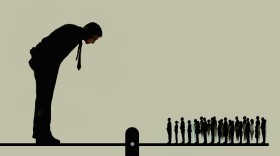
Tara Boyle
Tara Boyle is the supervising producer of NPR's Hidden Brain. In this role, Boyle oversees the production of both the Hidden Brain radio show and podcast, providing editorial guidance and support to host Shankar Vedantam and the shows' producers. Boyle also coordinates Shankar's Hidden Brain segments on Morning Edition and other NPR shows, and oversees collaborations with partners both internal and external to NPR. Previously, Boyle spent a decade at WAMU, the NPR station in Washington, D.C. She has reported for The Boston Globe, and began her career in public radio at WBUR in Boston.
-
When a newspaper shuts down, there are obvious costs to the community it serves: job losses, fewer local stories. But new research suggests there's another consequence that's harder to spot—one that comes with a hefty price tag for residents. This week on Hidden Brain we ask, who bears the cost when nobody wants to pay? For more information about the research in this episode, visit https://n.pr/2zSPraS.
-
More than 70,000 people died of drug overdoses last year — many of them from heroin and other opioids. One of the most widely-used tools to confront this crisis is a drug called naloxone. It can reverse an opioid overdose within seconds, and has been hailed by first responders and public health researchers. But earlier this year, two economists released a study that suggested naloxone might be leading some users to engage in riskier behavior — and causing more deaths than it saves. This week, we talk with researchers, drug users, and families about the mental calculus of opioid use, and why there's still so much we're struggling to understand about addiction. For more information about the research in this episode, visit https://n.pr/2OZfuGQ.
-
There is one truth that has endured through the first two years of Donald Trump's presidency: he has kept the support of the core voters who propelled him to the White House. This week on Hidden Brain, we explore two competing perspectives on the motivations of Trump supporters, and what they can tell us about the state of our union.
-
We all know the downsides of being poor. But what about the downsides of being rich? This week, we explore the psychology of scarcity...and excess.
-
If you live in a big city, you may have noticed new buildings popping up — a high-rise here, a skyscraper there. The concrete jungles that we've built over the past century have allowed millions of us to live in close proximity, and modern economies to flourish. But what have we given up by moving away from the forest environments in which humans first evolved? This week, we discuss this topic with psychologist Ming Kuo, who has studied the effects of nature for more than 30 years.
-
Decades ago, a group of women accused a prominent playwright of sexual misconduct. For the most part, the complaints went nowhere. In 2017, more women came forward. This time, people listened.
-
This week on Hidden Brain's radio show, we tackle a big topic: power. From our conflicted feelings toward the powerful, to the ways we gain and lose power ourselves, and how power can corrupt.
-
How many ads have you encountered today? On this week's radio replay, we discuss the insidiousness of advertising in American media.
-
Violent crimes committed by Muslims are much more likely to be reported as "terrorism." And that has disturbing consequences for the way Muslims are perceived.
-
When we think of lies, we think of the big stuff. We say, "I could never do something like that." But big lies start with small deceptions. Dan Ariely talks about why we lie and why we're honest.









